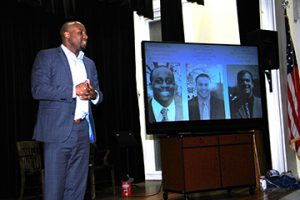Aaron Daley '04 on Leading from Within
As our country has navigated the COVID-19 pandemic, we have also been moving through a time of social upheaval when many difficult and systemic issues related to race have been at the forefront of both conversation and news. During this time, diversity, equity, and inclusion (DEI) initiatives have become a more pressing point of focus for many organizations. As schools come to terms with their own histories and current practices, opportunities come to light to make strides in this critical area. Bridgton Academy was able to speak recently with alumnus and trustee, Aaron Daly ’04, in regards to his thoughts about the importance of diversity not only in the boardroom, but also for organizations as a whole.
of social upheaval when many difficult and systemic issues related to race have been at the forefront of both conversation and news. During this time, diversity, equity, and inclusion (DEI) initiatives have become a more pressing point of focus for many organizations. As schools come to terms with their own histories and current practices, opportunities come to light to make strides in this critical area. Bridgton Academy was able to speak recently with alumnus and trustee, Aaron Daly ’04, in regards to his thoughts about the importance of diversity not only in the boardroom, but also for organizations as a whole.
“I grew up in New York City, where I had one foot in the streets and one foot in school,” Daly shares. “My dad wasn’t in the picture and my mother suffered from manic depression. I got lucky and had the opportunity to attend high school in Lewiston, Maine, then went on to Bridgton Academy. When I came to school in Maine, I didn’t feel like I was just representing the Daly family—I was representing every black male from an urban environment.”
“Later in life, I was invited to join the Bridgton Academy Board of Trustees. I remember that when I showed up to my initial meeting, the first thing I noticed wasn’t ‘I’m the only black person,’ it was ‘Oh, I’m young!’ I was not surprised by the composition of the board at that time. It was kind of what I expected. Nonprofit boards have to be intentional about their recruitment; otherwise, they’re just going to keep getting what they are used to. If you aren’t aware of your biases, you are going to recruit to them. When I was given the opportunity to spearhead the Academy’s Committee on Trustees, I saw a huge chance to really push the board to a different place.”
When forced to shine a light on our own history of diversity in board leadership, Bridgton had to come to terms with the understanding that, despite being a school with such a long-standing history, there was room for significant growth and improvement in this area. In his role as Chair of the Committee on Trustees, Aaron has put forward a strategy that allows Bridgton’s board to be more intentional in its recruitment—to find trustees from all backgrounds to really help lift and shape the organization. “I believe that the older you get, the harder it can be to change. Having younger voices and diverse voices in the boardroom is really meaningful and helps provide balance. When we are serving the young men of Bridgton Academy, it’s imperative that we have voices and faces that help to reflect our students in the boardroom.”
As Aaron became established as a volunteer leader at the Academy, he seized the opportunity to further prioritize Bridgton’s diversity initiatives at the highest level. While Aaron recognizes the importance of this work, he also acknowledges that it can be challenging for a young person of color to sometimes feel comfortable pushing new  initiatives. “I wasn’t intimidated or shocked when I joined the board; I just realized that we had room to improve. Being a trustee of color, I often feel that I have to be better or the best. I recall one time a fellow board member remarked that I always wear a shirt and tie to the meetings. For me, I know when I walk in a room, regardless of whether or not I can mentally compete, there are people looking at me and making an instant decision about who I am and what I bring to the table. I work to eliminate that from the get go. You aren’t going to pay attention to how I dress, because it’s going to be better than most in the room. You aren’t going to pay attention to how I speak, because I’m going to use proper English. I’m going to remove all the distractions. Then we can compete intellectually and see where things stand. I think many people of color are constantly going through that mental process. It’s what we do sometimes to survive.”
initiatives. “I wasn’t intimidated or shocked when I joined the board; I just realized that we had room to improve. Being a trustee of color, I often feel that I have to be better or the best. I recall one time a fellow board member remarked that I always wear a shirt and tie to the meetings. For me, I know when I walk in a room, regardless of whether or not I can mentally compete, there are people looking at me and making an instant decision about who I am and what I bring to the table. I work to eliminate that from the get go. You aren’t going to pay attention to how I dress, because it’s going to be better than most in the room. You aren’t going to pay attention to how I speak, because I’m going to use proper English. I’m going to remove all the distractions. Then we can compete intellectually and see where things stand. I think many people of color are constantly going through that mental process. It’s what we do sometimes to survive.”
A lack of diversity within school leadership is prevalent throughout the United States, in both private and public education. According to a recent study by the National School Boards Association, 78% of responding school board members are white. This representation gap, whether in public or private education, can create challenges on many levels for school leadership. “Diversity, equity, and inclusion work is critically important,” Daly states. “How can we, as a board, do what is right for a wide range of students at Bridgton Academy if we’ve never walked in their shoes? We need to bring people in who have a fair representation of the student body so they can bring their experience to the table. The board is making progress here. We are pushing, but we still need to reach a higher standard of excellence. A diverse board will more holistically serve the needs of the students of Bridgton Academy. Diversity allows us to bring forward different mindsets, to engage in more robust dialogue. We need many perspectives at the table in order to do everything that we possibly can for each young man who walks through the doors at Bridgton Academy.”
Daly reflects that many organizations these days are only ‘talking the talk’ about diversity initiatives, yet the true prioritization of this work is lacking. “I like to say that if you show me your organization’s budget, I will tell you what you care about. Very few successes happen by accident. I think a lot of people use the idea of ‘accidental success’ as an excuse because they want to be modest. Success is intentional. If you want to be strong in DEI work, you need to have a strategy and a plan. Organizations that want to improve in this area have to commit to doing this work and making the investment to ensure it happens.”
For Aaron, placing DEI initiatives at the forefront of the agenda for the Bridgton Academy Board of Trustees continues to be a priority. A large part of this effort is building the best trustee leadership group possible, one that is truly representative of all factions of the Bridgton family. “I’m looking for three things in potential trustees,” Daly shares. “They are the same things I look for when I’m hiring an employee. You need to be hungry—always working to improve. Just don’t call out something that is wrong, bring a solution to fix it. You need to be smart—not just IQ smart, but people smart. If you can’t work with others, you will just mess up the vibe. Lastly, you need to have humility. If you can’t listen to others, if you think your opinion matters more, it’s just not going to work.”
As Aaron marches forward with his efforts and initiatives, the broader Bridgton community is truly the beneficiary of his care, dedication, and hard work. “My goal is to do all that I can to make sure that the Academy’s board is the best it can be in the 21st century and the best we can be for the young men of Bridgton. That drives me forward in all that I do for this school.”
